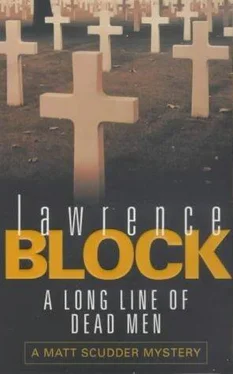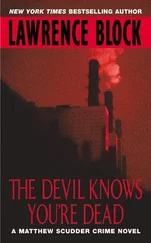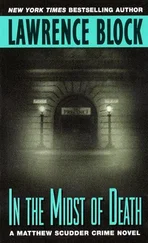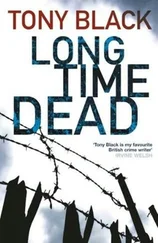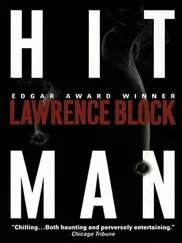Lawrence Block - A Long Line of Dead Men
Здесь есть возможность читать онлайн «Lawrence Block - A Long Line of Dead Men» весь текст электронной книги совершенно бесплатно (целиком полную версию без сокращений). В некоторых случаях можно слушать аудио, скачать через торрент в формате fb2 и присутствует краткое содержание. Жанр: Триллер, на английском языке. Описание произведения, (предисловие) а так же отзывы посетителей доступны на портале библиотеки ЛибКат.
- Название:A Long Line of Dead Men
- Автор:
- Жанр:
- Год:неизвестен
- ISBN:нет данных
- Рейтинг книги:5 / 5. Голосов: 1
-
Избранное:Добавить в избранное
- Отзывы:
-
Ваша оценка:
- 100
- 1
- 2
- 3
- 4
- 5
A Long Line of Dead Men: краткое содержание, описание и аннотация
Предлагаем к чтению аннотацию, описание, краткое содержание или предисловие (зависит от того, что написал сам автор книги «A Long Line of Dead Men»). Если вы не нашли необходимую информацию о книге — напишите в комментариях, мы постараемся отыскать её.
A Long Line of Dead Men — читать онлайн бесплатно полную книгу (весь текст) целиком
Ниже представлен текст книги, разбитый по страницам. Система сохранения места последней прочитанной страницы, позволяет с удобством читать онлайн бесплатно книгу «A Long Line of Dead Men», без необходимости каждый раз заново искать на чём Вы остановились. Поставьте закладку, и сможете в любой момент перейти на страницу, на которой закончили чтение.
Интервал:
Закладка:
"Didn't have to, it says here the super had a key. Woman across the hall noticed the smell."
She'd also told the investigating officers that Gabriel had seemed despondent since his wife's departure several years earlier, that his only visitors had been delivery boys from the liquor store and the Chinese restaurant. He'd worked up until two months of his death, managing a film lab in the West Forties, but had been out of work since then.
"Most likely drank himself out of the job," Selig offered.
His wife, apprised of his death, said she hadn't seen Gabriel since they'd signed their separation agreement in June of 1980. She described her late husband as a sad and lonely man, and seemed saddened herself if not terribly surprised by his death.
Fred Karp had left a note. He'd tapped it out on his computer screen, printed out two copies, left one on his desk and tucked the other, neatly folded, into his shirt pocket. I'm sorry, it read. I can't take it anymore. Please forgive me. Then he'd opened the window of his fifteenth-floor office and stepped out.
That's tough to do in the newer buildings, where you generally can't open the windows. Often they aren't windows at all, just glass walls. At an AA meeting I once heard an architect talk about how he'd had to reassure office workers who had a phobic response to glass walls. He used to run full speed and crash headlong into the wall to demonstrate its solidity. "People got the point," he said, "but I felt pretty stupid the time I broke my collarbone."
You could open the windows in Karp's building. It was a twenty-two-story prewar office building on Lexington Avenue, just a couple of blocks north of Grand Central Station and the Chrysler Building. Karp was an importer, dealing primarily in goods from Singapore and Indonesia. He'd sent his secretary home at five, called his wife to tell her he'd be working late. A deli on Third Avenue delivered two sandwiches and a container of coffee around seven. At ten after nine he went out the window, and it was easy to pinpoint the time of death because there were people on the street who saw him land. One of them collapsed, and was treated by paramedics at the scene.
This had happened just three years ago, and the police of-ficer I spoke to was still attached to the Seventeenth Precinct and had no difficulty remembering the incident. "Hell of a mess," he said, "and a hell of a way to do it. Suppose you change your mind halfway down. 'Hey. I take it back! I was only kidding!' Yeah, right, lots of luck."
There was no question in his mind that it was suicide. There was the note, on Karp's desk and in his pocket and right up there on the still-glowing screen of the computer monitor. And there were no injuries inconsistent with a fall from a great height, although he agreed that the fall itself would have erased evidence of an earlier blow to the head, or indeed of anything less obvious than a gunshot wound.
I said, "I wish the note was handwritten. Who on earth types out a suicide note on a computer?"
"It's a new world," he said. "You get used to a computer, you want to use it for everything. Pay your bills, balance your checkbook, keep your appointments straight. Here's a guy ran his whole business by computer. He wants to get the note right, he can tinker with it, phrase it just the way he wants it. Then he can print out all the copies he wants with one keystroke, plus he can save it on his hard drive." He was around thirty, part of the computer generation himself, and he was eager to tell me how the computers in the station house speeded up the paperwork and took a lot of the unpleasantness out of it. "Computers are great," he said. "But they spoil you. The trouble with the rest of life is there's no UNDO key."
I went to Karp's office, now occupied by an attorney specializing in patents, a man about my age with a drinker's complexion and the sour smell of failure clinging to him. He'd had the office for less than two years and knew nothing of its history. He let me look out his window, although I don't know what either of us thought I might see out there. I didn't tell him a previous tenant had taken a dive from that very window. I didn't want to give him any ideas.
Karp's widow, Felicia, lived in Forest Hills and taught math in a middle school in South Ozone Park. I phoned her at home around dinnertime and she said, "I can't believe the investigation's been reopened. Does this have something to do with the insurance?"
I told her it was in connection with another matter, and that I was trying to rule out the possibility that her husband's death had not been suicide.
"I never thought it was," she said forcefully. "But what else could it be? Listen, do you want to come to the house? I have two hours of tutoring to do tonight, but I could meet you tomorrow. Say four-thirty?"
She was waiting for me in the upper flat of a semidetached two-family house on Stafford Avenue, just a few blocks from where they used to play the tennis tournaments. She was a tall, angular woman with straight dark hair and a strong jawline. She had coffee made and we sat at her kitchen table. There was one of those black cat clocks on the wall, with the eyes rolling from side to side and the tail swinging like a pendulum. She said, "Isn't it ridiculous? The kids gave it to me for my birthday a couple of years ago, and I have to admit it's grown on me. Let's talk about Fred."
"All right."
"It never made sense to me that he would kill himself. They said he was having problems with his business. Well, he was in that business for over twenty years, and you always have problems. He never had trouble making a living. And we had two incomes, and we were never extravagant. Look where we live."
"It's a nice house."
"It's okay, and the neighborhood's decent, but it's not Sutton Place. The point is my husband wasn't under any great financial pressure. Look, after his death I ran the business myself long enough to straighten things out and get a few dollars for the stock and goodwill. The business was in fine shape. Day-to-day chaos, yes, but nothing unusual. Certainly nothing to kill yourself over."
"It's hard to know what goes on inside another person."
"I realize that. But why are you here, Mr. Scudder? You didn't schlepp all the way out here to talk me into accepting my husband's suicide."
I asked her if she knew anything about a club her husband had belonged to. She said, "What club? He was in the men's club at the temple but he wasn't very active. His work took too much of his time. He joined Rotary but that was at least ten years ago and I don't think he maintained his membership. That can't be what you're referring to."
"This was a club of fellows who had dinner once a year," I said. "In the spring, at a restaurant in Manhattan."
"Oh, that," she said. "What threw me off was your using the word 'club.' I don't think it was that formal, just a bunch of fellows who were friends in college and wanted to stay in touch over the years."
"Is that how he described the group?"
"I don't know that he ever 'described' it as such. That was certainly the impression I had. Why?"
"I understand it was a little more formal than that."
"It's possible. I know he never missed a dinner. One year we had tickets donated at the school, the Manhattan Light Opera, and Fred told me I'd have to find someone else to go with me. And he loved Gilbert and Sullivan, but he regarded his annual dinner as sacrosanct. What does the dinner have to do with his death? He died in December. The dinner was always sometime in April or May."
"The first Thursday in May."
"That's right, it was a set day every year. I'd forgotten. So?"
Was there any reason not to tell her? I said, "There have been a lot of deaths in the group over the years, more than you'd expect. Several of them were suicides."
Читать дальшеИнтервал:
Закладка:
Похожие книги на «A Long Line of Dead Men»
Представляем Вашему вниманию похожие книги на «A Long Line of Dead Men» списком для выбора. Мы отобрали схожую по названию и смыслу литературу в надежде предоставить читателям больше вариантов отыскать новые, интересные, ещё непрочитанные произведения.
Обсуждение, отзывы о книге «A Long Line of Dead Men» и просто собственные мнения читателей. Оставьте ваши комментарии, напишите, что Вы думаете о произведении, его смысле или главных героях. Укажите что конкретно понравилось, а что нет, и почему Вы так считаете.
